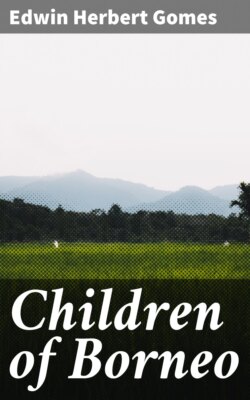Читать книгу Children of Borneo - Edwin Herbert Gomes - Страница 9
На сайте Литреса книга снята с продажи.
CHAPTER V
MANNER OF LIFE—OCCUPATION
ОглавлениеTable of Contents
The Dyaks are industrious and hard-working, and in the busy times of paddy[2] planting they work from early in the morning till dusk, only stopping for a meal at midday. The division of labour between the men and the women is a very reasonable one, and the women do their fair share of work. The men do the timber-felling, wood-cutting, clearing the land, house and boat building, and the heavier work generally. The women help in the lighter part of the farm work, husk and pound the rice they eat, cook, weave, make mats and baskets, fetch the water for their daily use from the well or river, and attend to the children.
With regard to paddy[2] planting on the hills, the work is divided between the men and women in the following manner. The men cut down the jungle where the paddy is to be planted. When the timber and shrubs have been burnt, the men and women plant the grain. The roots and stumps of trees are left in the ground. The men walk in front with a long heavy staff in the right hand of each, and make holes in the ground, about a foot apart. The women walk behind them and throw a few grains of seed in each hole.
When the paddy has grown a little, the ground has to be carefully weeded; this work is done by the women. When the crop is ripe, both men and women do the reaping. They walk between the rows of standing grain, and with a sharp, oddly-shaped little knife, they cut off the heads one by one, and place them in their baskets which are tied to their waists in front of them. The carrying home of the paddy thus reaped is mostly done by the men, who can carry very heavy loads on their back, though the women help in this work to some extent. The next thing is to separate the grain from the little tiny stems to which it is still attached. This is done by the men. The grain is placed on a large square sieve of rattan or cane, fixed between four posts in the verandah of the Dyak house, and the men tread on it and press it through the sieve. The paddy that falls through is taken and stored in the loft in large round bins made of bark.
When rice is wanted for food, the paddy is dried in the sun, and then pounded by the women in wooden mortars with pestles five feet long. As a rule two or three women each use their pestles at one mortar, which is cut out of the trunk of a tree. I have seen as many as six girls use their pestles in quick succession at one mortar. In this way the grain is freed from husk, and is made ready for food.
The Dyak marries at an early age, and lives in a long village house with many other families, and does his best to get as much paddy as possible each year. He rises on work-days early in the morning, partakes of his frugal meal of rice and salt, or rice and fish, varied by a piece of wild pork or venison, which he may have received as a gift or bought from some hunting friend. His wife wraps up his midday meal for him in the spathe of a Pinang palm, and he goes to his work of cutting down the jungle for planting, returning home in the evening.
There are days when he does not go to work on his paddy farm, but spends his time in getting firewood, or mending things in his room, or in sitting about in the common verandah chatting with his friends.
When the paddy is planted and has grown a little, and the time of weeding draws near, the family remove to the little hut put up in the paddy farm. When the weeding is done, the family return to the long Dyak house and remain there for about two months. Then they go back to their hut to watch the ripening paddy, and guard it against attacks of birds and beasts.
Paddy planting is the chief occupation of every Dyak, but he has plenty of time for other things, and his life is not quite so monotonous as may be supposed. The actual work of paddy planting, and everything connected with it, such as the building of farm huts, and the getting ready of farming implements, takes up seven or perhaps eight months of the year. The Dyak has therefore a certain amount of time during which he can visit his friends, make boats, or earn a little extra money by hunting for such jungle produce as canes, gutta, or camphor.
